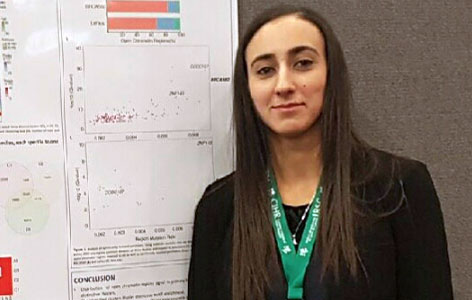
Conference: Canadian Cancer Research Conference, November 5-7, Vancouver, BC, Canada.
Conference Highlight: The conference focused on cancer prevention and therapy, as well as patient involvement programs to strengthen interactions between scientists and patients.
Conference Summary: The field of cancer immunotherapy has progressed exponentially during the past years; however, several questions remain unanswered. During one of the plenary sessions, titled Cancer and Immune System, experts presented the latest updates in the field of cancer immunotherapy. Dr. Marcus Butler (University Health Network) introduced the concept of warm tumours which are immune active and cold tumours which immune inactive, as well as the mechanisms underlying immunotherapy resistance in myeloma tumours. He also proposed an approach to make cold tumours immunologically active, thereby sensitizing them to immunotherapy. Dr. Ira Mellman (Genentech Inc.) explained the mechanism behind T cell exhaustion and proposed new therapeutic approaches including vaccines. Dr. Brad Nelson (BC Cancer Agengy) gave an overview of immunotherapy in Canada and showed that patients with tumour infiltrating lymphocytes (TILs) have a better survival rate. He also discussed an initiative for a pan Canadian TIL therapy using made-in-Canada chimeric antigen receptor T cells.
One of the sessions that I attended shed light on the opportunities that could contribute to the development of new therapies using DNA damage repair signaling. Dr. Daniel Durocher (Lunenfeld-Tanenbaum Research Institute) presented his work mapping DNA damage repair signaling using several techniques including CRISPR and proteomics screens. Dr. Graham Dellaire (Dalhousie University) discussed an assay that his laboratory developed known as ‘CRISPR LMNA-HDR’, which uses CRISPR to screen for small molecules that inhibit or enhance the activity of DNA repair pathways. Dr. Peter Sterling (BC Cancer Agency) presented his analysis of mutation signatures that accumulate in specific regions of the genome and their interaction with genotoxic drugs. The last speaker of the session, Dr. Jean-Yves Masson (Centre de Recherche sur le Cancer de l’Université Laval), reported his work examining the role of Palb2 in the formation of D-loop and genome maintenance.
Overall, the conference covered important cancer research topics, especially those related to immunotherapy and genomics.




